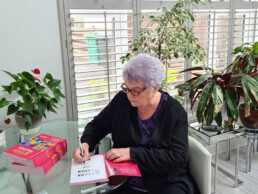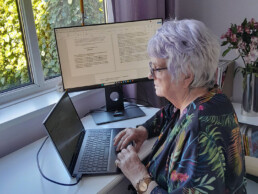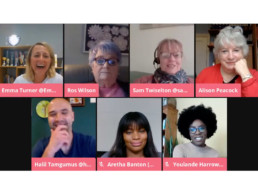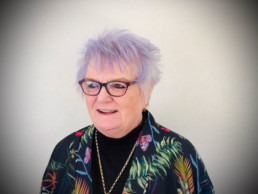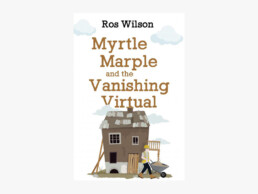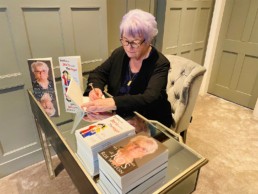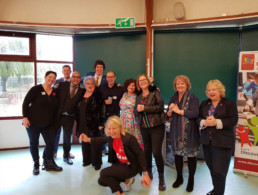Chapter 1 of It Takes 5 Years to Become a Teacher
Setting the Scene of My First Five Years
Times have changed so much over the years. When I started teaching in 1965, there was no help at all. I clearly remember being abandoned in an art room with a register and left to get on with it. No one offered advice and I knew no one to ask. It was a 700-pupil secondary school with a head, two deputies and 50 members of staff. I cannot remember any of them asking if I was alright or if I needed help. I had never marked a register before, my blackboard writing wobbled and I had planned no lessons as I had not been given a timetable.
I do remember being petrified. Nothing I had done at school or at college seemed to have prepared me adequately for this. I stood and looked at a class, sometimes in abject fear, not knowing what to say or do. Some ‘lessons’ proved totally unsuitable for the age of the groups they were prepared for and some were completed in 15 minutes with nothing else prepared to last the rest of the hour. I didn’t feel like a teacher, I didn’t think like a teacher and I didn’t look like a teacher.
Worst of all, I didn’t know how a 21-year-old teacher was supposed to feel, think or look and the school seemed to be populated with ‘old’ teachers so I had no immediate role models.
It didn’t help that I didn’t have any ‘real’ clothes suitable for a teacher, I keenly felt that my image was all wrong – I had never planned on teaching. Female teachers were not allowed to wear any form of trousers in school at that time, with the exception of PE teachers who were allowed to wear track suit bottoms in winter. As students, we were cut some slack, but now it was ‘for real’. Every day was a dilemma of what to wear, with the only two skirts I possessed both being very short and tight. Today, everyone is used to seeing women of all ages in fairly short, tight skirts, but in the 1960s it was only the younger generations and so – even on such a large staff – it was me, alone. My summer tops were basically different forms of T-shirts, mainly baggy and worn – and in winter I wore the same big home-knitted jumpers I had sported in college. Money was short and cheaper clothing was confined to the big cities. There was no internet, of course, and on a salary of £45 a month after tax, it was a long time before I could afford to make myself more presentable.
How I wish I had asked family for contributions to my wardrobe for my birthday when I knew I had been appointed. How you feel about your appearance is important (although you should not worry about what others think) and getting it right can be a big help. I was demoralised enough in those first months in the profession and worrying about my perceived unprofessional image only compounded the low self-esteem.
My register class was a Year 8 class of 12 to 13 year olds and the day was full of ringing bells. One bell brought the pupils in at 9am and one signalled us to go to the hall for assembly – a daily event led by the head wearing his graduation gown. The students stood in rows and sang two hymns accompanied by a woman on the grand piano. Then the head read a passage from the Bible, everyone said the Lord’s Prayer and we filed back out again. It was about as spiritual as a visit to the doctors. As this was going on, the second deputy head, Basher Burgess, was roaming up and down the rows of students, punching them in the kidneys and growling: ‘Jesus loves yer,’ in their ears. Periodically, he would fling an arm towards the double doors and a troublesome child would shuffle out to join the ever increasing line-up outside his office and – when assembly was over – Basher would fetch his cane and give each pupil three strokes on each hand. It was clearly a highly effective form of behaviour management as it was almost always the same pupils there the next day and the day after…
The final bell at the start of the day told register classes to go to their first lesson and I waited to see who would arrive in my room for their double period art lesson. In the end, I sent a student to the office to ask if I could please have a timetable so that I could be better prepared.
There were three art rooms, two were adjacent with a shared stock room between them and one – that of the head of art – was at the other end of the school. He never came down to my art room in the four and a half years I was there, and we never had a team meeting. Gordon was in the adjacent room to mine and I didn’t even meet him until my second week. I was petrified. I hid in my room and quaked. Classes came and went. Most of them were quite co-operative but I did have run-ins with the Year 10s on many occasions. They were leaving at the end of the year and were demob happy from my very first day in September. I didn’t know what to do about them and had no one to ask. I began to dread their lessons, the rudeness, occasional missiles flung and the loud conversations across the room.
When I plucked up the courage to ask Gordon about it after a month he just laughed and said Year 10s were always like that every year, but I couldn’t hear any noise coming from his end of the stockroom. There were no policies for guidance and no detentions.
The staffroom was large and full of easy chairs, usually in two circles with a single line round the extremities. I was totally ignored for the first two months and dreaded going in there. People appeared to have their own seats and sat in the same place at both break and lunch time. My first visit resulted in a rather large lady saying, ‘That’s Dennis’s seat!’ quite sharply when I went to sit down. Lunch was served in the hall and was equally traumatic. I hadn’t the courage to walk straight to the front of the long queue and could waste most of my lunch time waiting to be served. I soon abandoned school lunches and took a sandwich, which I ate in my art room, alone.
Building strong relationships with your colleagues is important. We all need to feel a part of something, we need friendship and a smile from time to time. We also need to have colleagues we can trust and whose advice we can seek. Professor Sam Twiselton has written about ‘getting in with the wrong crowd’ in her contribution, to be found in the opening section of the book. In a large school that is an easy mistake to make – there are always a few grumblers and dissenters in a staffroom. Unfortunately, in the last full-time post I held in a primary school in Kirklees, the dissenters were led by the deputy head! I didn’t ‘get in’ with anyone, grumblers or otherwise.
Leadership of a school is so important for newly qualified teachers. There was no leadership in my first experience of teaching – it was every one for themselves. I struggled, but I certainly wasn’t the worst. I remember passing poor Mr Baum’s class with horror. He had first years – aged 11 to 12 – and first years were with one teacher for all lessons except PE and science. Mr Baum’s class was totally out of control, missiles flew round the room and children climbed on chairs and desks while he stood – red faced and apoplectic – at the front trying to shout above the noise. He was a mature man who had trained late and this was his second year at the school. He left the profession at the end of my first year.
What I soon learned in that first school was that you can’t win by trying to out-shout pupils from challenging backgrounds. That first school was located in a small coal mining town, in the days when the pits were still open. In those days, the narrow streets were lined almost exclusively with two-bedroom, red brick terrace houses within which there were often two or three adults and three or four or more children. Life was crowded and noisy and frequently tempers would flare. Our students knew all about how to win by shouting… they knew less about how to respond to calm and peace and praise and kindness, so focusing on those qualities, and praising pupils who responded, was far more effective. Yet I still struggled, and there were many days when I stood in despair at the front of a noisy rabble and didn’t know whether to scream or cry.
Gradually, however, I made a few friends, earned my own seat in the staffroom and started to feel more a part of things. Perhaps I had been giving off the wrong vibes and that deterred staff from speaking? But I never found a mentor to advise me and support me in my early, blindfolded venture into the profession.
How I Bumbled My Way into Teaching
How could I go through three years at teacher training college and come out at the other end ignorant and totally unprepared for the job? There are three answers to that question.
The first thing to say is that I never wanted to be a teacher. I disliked teachers and schools intensely due to my own personal experience as a pupil in both primary and secondary school. My family circumstances deteriorated due to the death of my father when I was five, after he had spent two years in bed totally paralysed following a stroke. Mother was left with four children aged five to ten and no income in the days before widow’s pension or any sort of state benefit. In order to keep us all together, we moved to a huge Victorian semi-detached and took in six students from Leeds University. Life was hard and during the lengthy holidays we were quite impoverished. Sadly, I became quite dirty and neglected. The primary school I attended was quite ‘middle class’ and gradually I became isolated and lonely, and acquired the label ‘stink bomb’.
Secondary school was a little better as I learned to keep myself clean and tidy, and my two older sisters were already in the school. However, I was already disaffected and – although I was able enough to keep my place in the ‘A’ class of four streams – I didn’t work hard and I didn’t get on with many of the staff. It is a sad indictment of the profession to admit that, when on a day’s professional development, we were asked to think of the most inspirational teacher we had ever met during our own time at school, I was the only one of the 60 on the Kirklees Local Authority team unable to find one inspirational teacher from my personal past.
My one passion at the girls’ high school was art. In those days, I thought I was quite good at art and it led to me really wanting to leave high school at the end of Year 11 to go to Leeds Art College in order to become a commercial artist. However, when I informed the school of this midway through Year 11, I was summoned to the headteacher’s office and she reduced me to tears with a mix of sarcasm and ridicule. It transpired that no one left an ‘A’ class without completing sixth form and going to university. If I persisted in my application, she would tell the college the ‘truth’ about me as a scholar, but if I stayed on for sixth form, she would give me a reasonable reference. It was all about the numbers in a sixth form for funding in
those days.
I stayed on.
Part way through the first year of sixth form, however, I discovered that I could enter teacher training college with just six O-levels and no A-levels (I had scraped eight GCEs) at the end of first year sixth form due to the difference in age specification for entry. To start school, the age requirement was to be aged five by the start of the September of that school year. To enter college, the age requirement was to be 18 by the end of September. My birthday is in September – I had always been the oldest at school and now I was to be the youngest at college.
So, I escaped school early after all and ended up training for a profession I had no intention of pursuing in the future.
The final factor was that, due to the massive snows of 1963 and my partner-in-crime, who was on first teaching practice in the same rural primary school as myself, we managed to get through the second term’s teaching placement by not arriving at the school until 10.30 in the morning and leaving again at 2.30 in the afternoon, thus only teaching one real lesson a day. Ron, the minibus driver, was amazingly receptive to bribery and so we achieved being last to be dropped off in the morning (after enjoying a mug of steaming hot tea in a transport café with Ron) and the first to be picked up in the afternoon, even though we were not ‘at the end of the line’. We arrived at school with tales of being stuck in snow drifts or blocked by others stuck in the snow. A packet of cigarettes a week for our driver certainly did the business!
Our second teaching practice was in the final year, and this time I was on my own in a secondary school. This could have been regarded as a realistic introduction to ‘the other side of the desk’ as the experience was very similar to my first true post two terms later. The head of art spent my lessons in the staffroom and was quite disparaging about my outcomes yet offered no help at all – and I asked for none. I made no friends, and nobody gave me any advice. My teaching was mediocre, and I learned little from the experience – and especially because halfway through I was taken ill in school and sent home (a journey of which I have no memory). The next day mother called for the doctor and he came twice in four hours as he was so worried. My right arm and side were temporarily paralysed. Sufficient to say I missed over three weeks of the practice, and was threatened with a repeat of my third year as no one could miss longer than one week, but thanks to the senior lecturer at college, I was given a reprieve.
The amazing thing is that I entered a profession I disliked intensely, without any desire to teach at all, and with scarcely any actual teaching experience under my belt, but as soon as I discovered that you could treat pupils and learning in quite the opposite way to the way I was taught, I grew to love it and have loved it ever since.
I learned to model my practice on the teachers I admired most, I learned confidence and approachability, and most of all, I learned to ask for help when I needed it, even if it was never offered. Watching and learning from others is a great way to get started – you will soon adapt and customise your practice to reflect your personal preferences and style.
Departing from My First Post
A final complication in my early career was my chosen means of transport to school – a Honda 50 – a very small motor scooter, quite new to the scene at the time.
When I accepted the job at the secondary school, I hadn’t thought about how I would get there. It was a shock, therefore, to discover that the journey would involve a 20-minute bus ride to Wakefield bus station and then a change of buses for a 35-minute ride to Normanton followed by a ten-minute walk to the school. With delays and waits for buses, a total of up to one and a half hours at the beginning and end of each day. I only tried it once before school opened to know it was not feasible for a reluctant traveller, so I went to a garage in Wakefield and came out with a brand-new scooter bought on credit.
I loved that machine! I practised conscientiously prior to the first day of term and found I could complete the whole journey in anywhere between 30 and 45 minutes. Perfect! It would have helped if I had known what time teachers usually started at schools in those days (not nearly as early as they do today), so I made a guesstimate and roared into the front gates at 20 to 9 of day one! That was not early enough – even for the ’60s – as a really angry faced woman standing with folded arms and legs akimbo on the top step of the main entrance informed me in no uncertain terms.
Very Angry Lady did not introduce herself by either name or post, she did not shake my hand or welcome me to the school or the profession. She snarled:
‘Follow me!’ and I grabbed my bags and followed her, helmet flaps flapping, down two corridors, through a hall, down a third corridor and round a corner where she opened the door on the left, virtually pushed me in, thrust a register at me, and growled:
‘This is your room, this is your register,’ and left.
That lady never spoke to me again in the four and a half years I was at the school. She was the first deputy head. Actually – that was not true – she did turn back at the door and snap:
‘And shift that wretched machine from the front of the school and never park it there again!’
Riding a small scooter not built to travel at more than 50 miles an hour may be a pleasure on most summer and early autumn days, but in the depths of winter it is often a horror. I would arrive at school battered and bedraggled, often soaking wet and very cold. I couldn’t afford (and probably wouldn’t have worn) suitable waterproofs for the job, and a duffle coat and helmet are not the most protective all-weather wear.
I often set off a little late and would be pushing the small machine beyond its capacity, hurtling round bends as though I was in the TT on the Isle of Man. I had many near misses but only actually fell off once, skidding sideways in heavy rain on the top of the moorland – much to the pleasure, it seemed, of the gentleman following me in a small, grey car. He parked close to me, got out and greeted me (still lying on the road in the rain) with
the words:
‘I knew you were going to fall off, you were riding much too fast.’
Luckily, I was completely alright except for one grazed leg, but it did take some of the fun out of my future journeys. I also got tired of the endless jokes on the playground and in the staffroom about Batman, Super Woman, Ros Sheene or Ros Dunlop (after two famous motorcyclists), Chug Chug Girl, Ros the Drip and so on and so on…
After four and a half years, I had had enough of the travel and was seeking a job nearer to home.
My Top Tips for Starting a New Post
- Remember that everyone struggles in some areas at the beginning, persevere – it will all come right in the end.
- Keep calm or at least fake calmness!
- Praise those children who work hard and behave, and ignore those who don’t – unless there is danger!
- Ask for help if no one has offered it.
- Accept all the help you can get and listen to your mentor and others.
- Make friends and ask them for advice when you need it.
- Buy a couple of appropriate professional outfits and a change of shirts/tops to accompany them – dress to feel good about yourself.
- Consider your journey to school before accepting a post. Many new teachers need to accept the first job they are offered, but you still need to take care of yourself and – if you can afford it – a small car is still the best means if public transport is too challenging. After a few weeks, you will probably be able to agree a car share with another member of staff for the environment’s sake.
Talk:Write
A fun and flexible approach to improving children’s vocabulary, speech, and writing.
Filmclasspod
Recently, I was privileged to record a podcast with Shain and Sean for @filmclasspod. When I agreed to doing this, I had assumed that we would be talking about children’s writing, my work or my recent books. Wrong! Guess who hadn’t done her research well enough? Shain and Sean were in the middle of recording a series of interviews with people known in the world of literacy – specifically, at this time, focussing on JK Rowling and the Harry Potter Series.
“Of course, that’s fine.” I confirmed with a gulp – not daring to point out that I had never finished reading the series. “I’d especially love to discuss the very first book…”
“Oh no, sorry, we are on to book 3 now, The Prisoner of Azkaban. Is that OK for you?”
“Of course it is, I would love to review that with you,” I croaked… and I went off to weep on the loo.
Book 3 of the Harry Potter series was the book that turned me off the series! I didn’t finish reading it when it first came out in 1999 and I never read another of the series after that. It had a lot to answer for! I had loved books 1 and 2 – and like so many fans – I had waited eagerly for book 3. What a disappointment it was to me when it came out. It seemed complicated and confused, as though JK Rowling thought that to write as a boy now in his teens, you needed to write a complex and tortuous text. I barely read four chapters before abandoning Harry to his wizarding ways and finding myself a new hero.
So, I got on Amazon and bought the book… I watched the movie with my grandchildren… I re-launched myself into the book… AND I ENJOYED IT!
Perhaps because I had such dreadful memories of it, The Prisoner of Azkaban turned out to only have miniscule glitches and – for much of it – held me in its thrall. Perhaps watching the movie first clarified some of the confusion I had felt first time? Certainly, the book clarified some plot mysteries in the movie the second time. All in all, it transpired to be an enjoyable interlude in a working week.
I also learnt a lot from Shain, who is extremely knowledgeable on the entire Harry Potter series. She explained so clearly how the 3rd movie was the first that really strayed away from the text at certain points, and we agreed that perhaps the director had felt a similar disquiet to my own at times, leading to this change in interpretation. The first two movies had followed the plot of the appropriate books so closely.
In retrospect, I enjoyed the whole experience very much and was only left with one small area of irritation: poor proof reading in the early and late sections of the book – despite reprints.
Enjoy this podcast and other great discussions on their website or on Twitter – @filmclasspod.
A few proofing errors (in the form of contradictions) from The Prisoner of Azkaban:
Page 50:
Harry follows Tom up ‘a handsome wooden staircase’ in The Leaky Cauldron.
Page 74:
The boys heave their trunks down ‘The Leaky Cauldron’s narrow staircase.’
*****
Page 76:
‘Harry and Mr. Weasley led the way to the end of the train, past packed compartments, to a carriage that looked quite empty. They loaded the trunks onto it, stowed Hedwig and Crookshanks in the luggage rack, then went back outside…’
Page 78:
Harry, Ron and Hermione set off down the corridor looking for an empty compartment, but all were full except for the one at the very end of the train. This only had one occupant, a man sitting fast asleep next to the window.’
Page 83:
‘People were chasing backwards and forwards past the door of their compartment.’
*****
Page: 363:
‘Ron crawled to the four-poster bed and collapsed onto it…’
Page 363:
Lupin enters the room, ‘His eyes flickered over Ron, lying on the floor…’
Page 368:
Black and Crookshanks climbed onto the bed and ‘…Ron edged away from them.’
Page 372:
‘Harry caught him (Ron) and pushed him………… back on the bed!’
Talk:Write
A fun and flexible approach to improving children’s vocabulary, speech, and writing.
The Launch of It Takes 5 Years...
What a happy day Saturday 24th October 2020 was! That was the day we held a virtual launch of #ItTakes5Years…
It was my good friends, Dame Alison Peacock and Professor Sam Twiselton, who persuaded me we should have a launch and it was Richard Robinson’s idea to ask Emma Turner to host the event – and a brilliant idea it was. She’s a natural and keeps the flow going beautifully.
I wrote to all the original eight co-authors who had so swiftly and willingly contributed moments from their early careers for inclusion in the book, asking if any would be willing and able to join us on a Saturday morning and to my amazement every one of them replied promptly that they would. How I wish I could have invited all the other eighteen contributors but it would have made us all so small on ‘streamyard’ that we wouldn’t be seen, and there would not have been enough time for all to do more than introduce themselves… We shall save the full team appearance for the live launch post the pandemic.
Explaining the thinking behind this high-speed publication – seven weeks to write, three weeks of proofing and assembling and one week to publish thanks to Richard and Ben, my colleagues – was an important element of the introduction to the event between Emma and myself; that innocent conversation over a Chinese meal with Kirstie and Ben led to the fastest turn-around I have ever known. Yes, that all-important throw-away remark by myself to Kirstie all those years ago over dinner in a hotel when she was my front-of-house, before she converted her degree into a teaching , certainly led to the fastest write over long hours six days a week to produce this guidance and advice for early career teachers in time for the new school year. And we did it! And we made the remark the title of the book!
It was when the sections from the co-authors came in that I suddenly realised, to my great surprise, that every one of the eight of us had had such similar experiences and emotions at the start of our careers. That was what led me to throw the net wider and ask on twitter if anyone else would be so generous as to contribute, and I am deeply grateful for the additional eighteen contributors who stepped forward so willingly. And yes – their early career experiences replicated the pattern. Yet no-one had told any of us how hard it would be at times in those first years in the classroom, how much we would want to bare our souls to someone and say how we were really struggling at times, even though it seems safe to assume that most of the lecturers who taught us and the colleagues in the staff rooms had almost all had similar experiences and worries.
So that was the premise of the book – to make the great reveal and to announce to our newly qualified colleagues the best guarded secrets of education – that ‘the emperor has no clothes on’.
My sincere thanks to all who contributed in any way, to all who ‘attended’ on the 24th and to the thousands who have viewed the video since, as well as to the many who have purchased the book and for the warm and generous feedback they have given us.
Talk:Write
A fun and flexible approach to improving children’s vocabulary, speech, and writing.
It Takes 5 Years...
I was sitting chatting with Kirstie Pilmer one Sunday afternoon in late May (at a safe ten feet of course) when Kirstie started telling me about how much she was enjoying her fifth year of teaching as a qualified teacher.
“Do you remember telling me it takes five years to become a fully effective teacher?” she asked. “I thought that must be an exaggeration and I remember thinking in my third year that I really was a fully effective teacher. But now I see what you mean. I don’t have to think about it anymore. I can sail into my classroom and start, I can respond to wherever the children take the learning, I can throw in anecdotes and jokes and illustrations and examples… It has become a fluid and natural process and I LOVE it!”
“That certainly won’t be how this year’s NQTs will be feeling in September, having been in lockdown since March,” I said. “Nor even those in their second year, as they only completed half of their NQT year in normality.”
We discussed the stresses and issues teachers in their first four or five years would be facing during lockdown and whatever came after it, and the fact that they would need lots of help and support.
“The trouble is,” I commented, “everyone will be needing help and support for as long as this lasts, regardless of how long they have been teaching, because it is a new crisis for everyone. No-one has ever been through this before… no-one can advise… there isn’t a book on how to do it. Headteachers have been amazing at keeping schools running in such terrible circumstances.”
And that’s when the penny dropped! We couldn’t write a book to help experienced teachers through the worst pandemic ever to hit the globe, that would be a job for the future if ever needed, but we could write a book to help those in the early stages of their professional career.
“Do you think you could tell the story of your first five years in the profession, Kirstie?” I asked. “Warts and all, that difficult class you had last year and the stresses and problems you have met on your journey?”
It didn’t take long to persuade my professional friend of ten years (Kirstie used to be my ‘front of house’ and driver for almost three years after she graduated and before she trained as a teacher) that her input would be invaluable for those new to teaching and that her contribution could be a vital part of the book. And it was thus that the idea was born.
“I have just finished my fifth year of teaching and it was a completely different experience. I was confident in my ‘teacher skin’ for the first time… it feels as though someone just flicked a switch and suddenly, I got it. Things I wasn’t sure about previously slotted into place, and now I feel like I can see the whole picture rather than lots of little parts of it.”
(Kirstie Pilmer, August 2020)
As I started to take down notes and ideas and the book started to take shape in my mind, I suddenly realised that the experiences of just two teachers (Kirstie and myself) was not enough for a balanced picture and I approached the seven esteemed colleagues at the peak of our profession, who all agreed to be co-authors, contributing pieces of two hundred words or more on their early experiences in the classroom. Then I had the idea of tweeting to see if anyone else would be interested in joining us and this resulted in eighteen absolutely fascinating accounts of teachers’ journeys into teaching, some written by teachers in the very early stages of their careers and others by colleagues close to retirement, by consultants and by university lecturers. These contributions give the text authenticity and I am so grateful to all the co-authors and contributors for their enthusiasm and time.
“Then came the wrath of the former PE co-ordinator. I naively thought he had happily swapped from PE to maths… There was bad feeling, which came my way by association… I remember one day in a crowded staffroom he said:
‘I bet she doesn’t even know the off-side rule.’
That night I enrolled in evening school to become a qualified football referee. Needless to say once I qualified, I knew more than he did about the off-side rule. Boom! Back of the net!”
(Ginny Bootman August 2020)
Meanwhile, I commenced the writing of the actual book in June and wrote solidly for seven weeks. The words just poured out… I scarcely had to refer to my research or notes. I was staggered at the way details from over fifty years ago and on through my career came flooding back – particularly the trying and tough times. I often wrote for between six and ten hours a day and my part of the book was finished in first draft in seven weeks. The fastest write ever for me.
The seven co-authors and eighteen contributors had a tight deadline too. We considered it essential to have this book available from the start of the new academic year in September. Every single one of them met the deadline and I then switched to compiling the book itself.
I spent a full week on proofing, editing and rewriting my own contribution (sixteen chapters) and on proofing the contributions as they came in. Then the document went to Richard Robinson for two consecutive proof reads and the process of publishing. Richard is the best proof reader I know – alongside my brother who also did one proofread. When all proofs were complete and all edits had been made we had exactly met our deadline of the 19th of August and the completed manuscript went to print on target, on the 31st of August. On Wednesday the 2nd September a large palette of boxes of books was delivered to Richard’s office. The remainder of the week was spent signing pre-release orders and all the co-authors’ and contributors’ copies and the big post-out occurred on schedule with books available from Friday the 4th of September. Job done!
It was during this intense process of compilation and proofing that the amazing fact hit me – the experiences of almost every one of the twenty-seven of us at the start of our careers were so very similar. That is when I finally realised how important the book might be. All except two of us had experienced similar fears, worries and stresses and a significant number of us had had to find our own way through, with little or no real help. That is the experience that has driven so many to leave our profession after only one or two years recently. ‘It Takes Five Years to Become a Teacher’ aims to help these teachers to survive and to thrive!
“Little did I realise that the window was unfastened and as I leant back, smiling and feeling cocky, the window opened right out and I literally fell backwards straight out of the window – proper Del Boy style – and landed on the back path…
Safe to say no more work was done that afternoon, and during the three more years spent in that classroom, I never sat on the side again!”
(Alex Caunt August 2020)
Talk:Write
A fun and flexible approach to improving children’s vocabulary, speech, and writing.
Scottish Exam Results
Such a controversy! The Scottish Government battered into an apology and total backdown – and quite rightly too. If the reason many students’ grades were lowered was truly their post code, it is not surprising that the powers that be are humiliated. The First Minister admitted that ‘serious errors were made’.
A total of 133,762 individual results were adjusted by the Scottish Qualifications Authority (SQA) from the 511,070 initial estimates of grades that were submitted by teachers. Only 9,198 of the estimates were adjusted up. 124,564 were adjusted down. Almost all (96%) were adjusted by a whole grade. Fewer than 10,000 were raised.
The SQA felt that many teachers had been too generous in their estimates of grades.
One of the factors the SQA decided to use to decide whether a grade should be changed is the performance of the school over the previous four years. This was potentially a life-changing decision for a significant number of students. Students who had consistently achieved highly in school found their grades reduced to reflect their school’s previous performance rather than their own abilities.
Of particular concern was the disproportionate effect on students living in areas of economic disadvantage as SQA were influenced by their historical evidence that the poorer the area the less well students performed. In the most deprived areas, moderators reduced results sufficiently that the proportion of students getting A to C grades fell by 15 percentage points compared to the schools’ teacher estimates. In the most affluent areas, the drop was only by 7 points.
Nicola Sturgeon claimed, initially, that this step had been necessary to make the results credible, and that without this moderation system 85% of students in the most deprived areas would have passed Highers this years, as opposed to 65% in previous years.
My only comment would be, that this flattening of results through so called ‘moderation’ has gone on for many years. Without annual ‘flattening’ of scores to reflect history, perhaps a steady rise towards 85% might have been seen? We shall never know. However, hopefully, one good outcome of this tragic pandemic could be a proper re-examination and reform of the marking of our examination systems.
My own experience in education led to my underperforming in term time throughout school, yet mainly performing well in examinations. Had I been a student of the pandemic, I might never have been admitted to the profession of education. More on this in my next blog, following the release of the English results.
Myrtle Marple
I love this book! I had great fun writing both the first two books of this series – yes, the second has been finished as long as this first one – it just hasn’t gone through publishing yet. Why am I so keen, when I am truly proud of ‘Journeys’ and ‘Bonkers Boris’ cracks me up? I think it is because – secretly – Myrtle is me!
The house is a house I once lived in… the setting is a setting I once loved. The only things I never had are Myrtle’s gadgets – but I wish I had! The extraordinary relationship that develops between the twins and Myrtle is the heart of the series. The twins are so alike and yet so different… Dan (Daniella) is far the more sensible one, although far from afraid of going on an adventure, while Dom (Dominic) is much more of a risk taker, albeit with a touch of flatulence.
This unusual trio haven’t even met at the start of this first book and, when they do first meet there is some caution and a couple of clashes. However, when Myrtle’s precious virtual friend, Doogle, goes missing, they become a tightly knit team. Which is just as well, as Dom gets himself into quite a scrape.
This was the first book for children that I actually completed and submitted for publishing, and I was thrilled when Olympia accepted it. However, due to my insistence on receiving hard copy for proofing – I always used to proof on hard copy – the second proofing was lost by the British Post Office and the publishers started the process again. Consequently, Bonkers Boris Meets the Mayor sailed past Myrtle and pipped her to the post. And I stopped demanding hard copies!
The two series are not in competition of course, mainly because the target ages are quite different as demonstrated in their length, form and illustrations. Bonkers Boris is aimed primarily at six to ten year olds, while Myrtle’s main audience will be nine to twelve year olds, although with parents or teachers reading them to children, wider audiences will enjoy the stories.
So, much as I adore the disaster-defined Boris, Myrtle will always have a special place in my heart!
A Nerve Wracking Week
The publication of my 1st 2 books for entertainment.
I thought I would be so excited when my first 2 books for entertainment arrived from the publisher. Of course, I had already had several educational books published but that was not the same. They told it like it was, if you believed in what I was writing about the books made perfect sense, if you didn’t – they didn’t. Both attitudes I was perfectly comfortable with.
Now, in semi-retirement, I had written my first three ‘books for fun’. One (It’s Just a Journey With Ros) had been started in 2014 and abandoned due to pressure of work, the second (Myrtle Marple and the Vanishing Virtual) was started in the same year and the third (Bonkers Boris Meets the Mayor) was started in 2015 and also abandoned for the same reason. All of them were resurrected and completed following my relocation to Leeds.
I think the publishers (Olympia) were a little horrified when this trio of books followed each other to their desks in rapid succession in the last months of 2018 and the early part of 2019, but to give them credit they stuck with me and accepted all three for publication. Sadly, Myrtle Marple was lost by the Post Office when it had been returned for a proof read and that book had to restart proofing again (usually there are 5 proofs before signing off, one by the Olympia proof reader, three by myself plus one by a person of my choice). Myrtle Marple is now moving successfully through the process.
For my personal choice of proofer it was a no-brainer. Richard Robinson is the best proofer I know and is so thorough and such a rigorous critic. It meant a huge amount to me when he actually enjoyed my books, saying they were well written.
Having gone through all these steps to achieve publication, and the wait of over a year in the case of Journeys, it was a great shock to me how nervous I was when the first set of complimentary books arrived. I gave all those away to educators I admired and was surprised to find that suddenly – of the 25 of each book I had received – I had none left! Not even one of each for myself.
Silence! I waited and worried and feared that I might be exposed on Twitter or similar as the emperor with no clothes on! And then, the next day, the rash of tweets started with lovely comments and photographs of people opening or holding up their copies and expressing excitement to be a recipient.
I shall always be grateful for those first generous words of feedback, as I pursue my new career in writing.
#ThankATeacher
Today is May 20th – the national ‘Thank a Teacher Day’. Now I am a 24 hour news addict and have already listened to and part watched 3 hours of the BBC 24 hour news, but I haven’t heard anyone thank a teacher for anything.
I try not to get involved in political issues on Twitter, a social media I love and engage with almost every day. The truth is I am a swing voter – I go for the person rather than the party – and that has led to me getting my fingers burnt quite a number of times. I never voted for Margaret Thatcher, I felt she was arrogant and self-serving, and I voted for Blair twice – the first time I was delighted with his leadership and the second I was devastated – but now I am behind Boris in principle, purely because he makes me laugh and he is so positive.
My point is that no politicians and parties seem to really value our profession and want to thank the hard working and dedicated people working within it.
When all is well in the world, teachers rarely get a mention in politics. When there is a crisis, such as a rise in disease, in poor behaviour, in unwanted pregnancies, in knife crime or similar – it is ‘Why don’t the teachers sort it out?’ Not the parents… not the politicians… In most countries in Europe social education is not the responsibility of the teacher, they teach the curriculum and little else. I am not saying we shouldn’t teach social behaviour, I am saying we get no thanks when we do it and we get the blame when we don’t.
One headline this morning referred to teachers ‘going back to work’. News Flash! They never stopped working! Most schools are still open with teachers in classrooms alternate weeks and preparing home learning resources and lessons in between.
At this moment, there are countless zoom meetings and leadership team planning sessions for a possible re-opening from June 1st, with much measuring of classrooms and tables, route planning and re-timetabling to allow staggered breaks and outside play. And a huge amount of stress!
No-one consulted the teachers and now there is a hotbed of objection and a political tug-of-war with the BMA, the teaching unions and Michael Gove (who doesn’t improve in the eyes of the profession) all throwing their two-penn’orth in. Will it happen? I doubt it. Who can justify the bizarre suggestion that you can teach a 4 year old to read by sitting 7 feet away from them with a book in front of them? If anyone should be back in school it should be Key Stages 2, 3 and 4. The 4 and 5 year olds need contact, are tactile and need rich stimulation and play – social distancing is just what they DON’T need and will not be able to respect.
The political battles wage on around us, the blame game continues and those who know nothing put down those who know so much and know what won’t work, isn’t safe or isn’t right. And no-body seems to have remembered to just stand up and THANK our wonderful, selfless and dedicated teachers.
Regardless of politics, teachers love their job, the privilege of working with their pupils and their schools and communities. They only want what’s best for the children they teach and the community they serve. They have worked and continue to work all hours despite the view that schools are closed. They want to be back at school more than anything, but only when it is safe for everyone.
So I say a huge thank you to all the teachers, teaching assistants, leaders, headteachers, cleaners, cooks, and support staff in our schools across the four countries of the United Kingdom. The government should rise and salute you!


